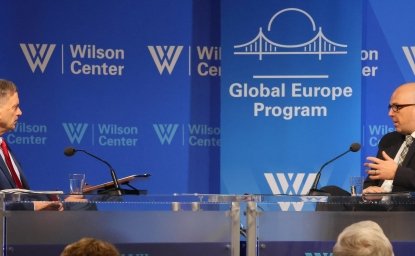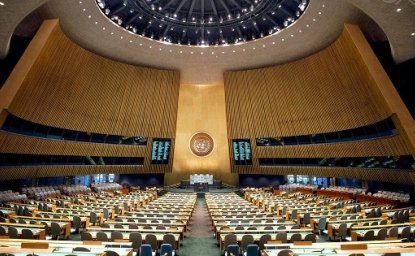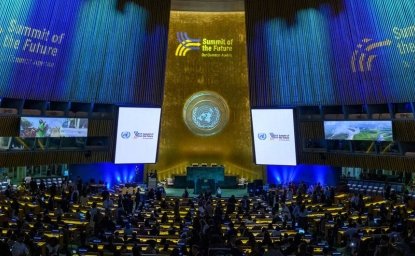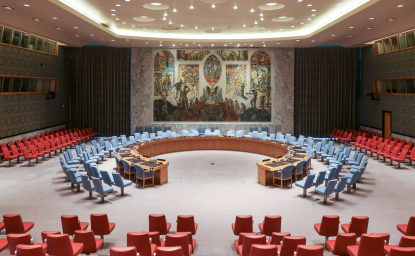The United Nations Assistance Mission to Iraq (UNAMI) was established by UN Security Council Resolution 1500 in August 2003, four months after the appointment of a United Nations Special Representative to Iraq following the fall of the Baath regime. Its primary role was to support the Coalition Provisional Authority, led by Paul Bremer, and the Iraqi Governing Council in establishing democratic governance and rebuilding state institutions.
While the UN Country Team, composed of some 22 agencies, funds, and programs, focuses on humanitarian assistance and helping Iraq meet its Sustainable Development Goals, UNAMI functions as a distinctly political mission. Its mandate has been renewed annually at the request of the Iraqi government and reports to the Department of Political Affairs in New York. UN Security Council Resolution 1770 of 2007 significantly expanded UNAMI's role to include fostering political dialogue and reconciliation, providing electoral assistance, promoting human rights and judicial reform, and engaging neighboring countries.
UNAMI mandate under review
Upon assuming office in October 2022, Iraqi Prime Minister Mohammed Shiya Al-Sudani decided, with broad support from his governing coalition, that UNAMI’s role was no longer necessary. Central to this decision was Iraq’s desire to establish a sense of normalcy, given the vastly improved security situation and relatively stable political climate. The government sought to shed the perception of dependence on international assistance and emphasize that Iraq could independently resolve its domestic and foreign disputes without UNAMI’s mediation.
In May 2023, UN Security Council Resolution 2682 commissioned an independent strategic review of UNAMI, led by Germany’s Volker Perthes. The review included consultations in Iraq in November 2023, during which the team met with a range of stakeholders, including national and local government officials, political party leaders, and members of civil society. It assessed three key areas: current threats to Iraq’s peace and security, recommendations to optimize UNAMI’s mandate, and ways to support Iraq in strengthening regional cooperation.
Perthes concluded that Iraq’s political system had become increasingly capable of managing internal and external crises with less violence. His report also asserted that an indefinite third-party role in resolving Iraq’s disputes could disincentivize national solutions and diminish local ownership of political processes, affirming that "no United Nations special political mission should stay in a country forever." The report recommended that UNAMI’s mandate be gradually reduced to humanitarian and development activities before transferring those responsibilities to the UN Country Team over a two-year period as part of an “orderly reconfiguration.”
Following the release of the strategic review, in a May 2024 letter Sudani formally requested to the UN Secretary-General that UNAMI be terminated by December 31, 2025, asserting that "there are no longer any justifications for the presence of a political mission in Iraq." In the interim, he requested that UNAMI’s activities be restricted to economic reform, service delivery, sustainable development, climate change, and other non-political functions.
Three weeks later, the UN Security Council adopted Resolution 2732, which extended UNAMI’s mandate for a final time, aligning with the Iraqi government’s proposed timeline. The resolution directed the Secretary-General to prepare a transition and liquidation plan for UNAMI, set for completion by December 31, 2024. However, developments in the broader region quickly outpaced the resolution’s assumptions, dramatically reshaping the security landscape that UNAMI was preparing to leave behind.
Regional conflict escalates
Although the strategic review’s assessment of threats to Iraq’s peace and security noted concerns about a potential ISIS resurgence and the proliferation of armed actors, it did not fully anticipate the extent of the fallout from the conflict in Gaza, referring only to "uncertainties about the impact on Iraq of the current regional escalation." With the subsequent escalation of violence between Israel and Iran during the latter half of the year, marked by Israel’s intensified conflict with Hezbollah and Iran’s unprecedented ballistic missile strikes on Israel, concerns grew that Israel might extend its attacks into Iraq, targeting Iran-aligned paramilitary groups that are part of the so-called Axis of Resistance.
In November 2024, Israeli Foreign Minister Gideon Sa’ar sent a letter to the UN Security Council asserting Israel's right to self-defense and urging action against these groups, which he claimed were "subsidiaries" of the state-funded Popular Mobilization Forces. Prime Minister Sudani condemned the letter as a pretext for potential aggression against Iraq, emphasizing that decisions of war and peace are solely within the authority of the Iraqi state.
It was only through concerted political and diplomatic efforts—both from the Iraqi government pressuring armed groups to halt drone attacks on Israeli targets and through regional diplomacy—that further violence was averted.
A key figure in these efforts was the recently appointed UN Special Representative to Iraq, Mohamed Al Hassan. Arriving in Iraq in October 2024 amid the height of the violence in Lebanon, Hassan had been originally tasked with overseeing UNAMI’s transition and liquidation. However, he quickly found himself managing a serious geopolitical crisis. As an Arabic-speaking diplomat from Oman, he was able to effectively engage with Iraqi counterparts, including a rare meeting with Grand Ayatollah Ali Al-Sistani in Najaf. This meeting led to a statement from Sistani’s office that was widely hailed as a roadmap for securing Iraq’s long-term stability. The statement underscored the necessity of “preventing external interventions in all their forms,” alluding to both Israel and Iran, and explicitly calling for restricting weapons to state control—a clear reference to armed factions operating outside government authority.
Hassan’s diplomatic efforts extended to regional engagements, including a visit to Tehran, where he urged senior leaders to help keep Iraq shielded from the broader regional conflict. His measured and discreet approach stood in contrast to some of his predecessors, who were at times viewed as overstepping their role in Iraq’s internal affairs.
Redefining UNAMI’s mandate
While Iraq has demonstrated increasing capability in maintaining domestic peace and security—whether through negotiations with Erbil over revenue-sharing, organizing long-overdue local elections in the contested province of Kirkuk, or negotiating a bilateral security arrangement with the United States to prevent an ISIS resurgence—the risk of regional instability remains high. Iraq’s diplomatic efforts to strengthen political and economic ties with its neighbors through advancing the Development Road project and hosting the upcoming Arab League Summit in May reflect its growing confidence on the international stage.
However, maintaining a neutral third-party presence like UNAMI, which has direct access to the UN Security Council, could be strategically beneficial. As Iraq navigates complex regional dynamics, having a mission with a well-defined and limited mandate could act as a stabilizing force, helping to defuse external tensions before they escalate into direct threats. UNAMI’s presence would offer not only diplomatic leverage in managing external pressures but also a structured platform for engagement with key international stakeholders, ensuring that Iraq’s interests are effectively represented on the global stage.
At the same time, Iraq’s leadership seeks to assert its sovereignty and minimize any perception of reliance on external actors. The challenge lies in balancing this goal with the reality of regional instability, where even a minor escalation could have far-reaching consequences. A carefully calibrated UN role, focused strictly on external mediation, could provide Iraq with an additional layer of diplomatic insulation, reinforcing stability without compromising national autonomy.
Given how close Iraq came to being dragged into last year’s regional turbulence, Iraqi leaders should carefully evaluate the advantages of retaining a UNAMI mission beyond the December 31 deadline, dedicated solely to safeguarding Iraq’s stability and preventing external crises from spilling over its borders. Ultimately, Iraq's ability to navigate these challenges will define its future as a sovereign and stable state in an increasingly volatile region.
The views represented in this piece are those of the author and do not express the official position of the Wilson Center.
Ali Al-Mawlawi is director of Horizon Advisory, a London-based consultancy specializing in political economy analysis and governance reform.







